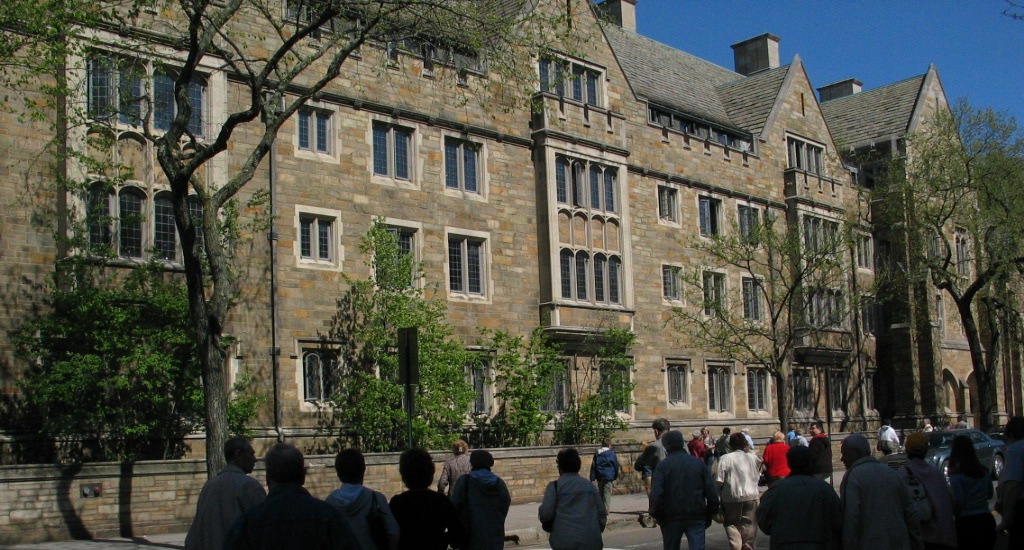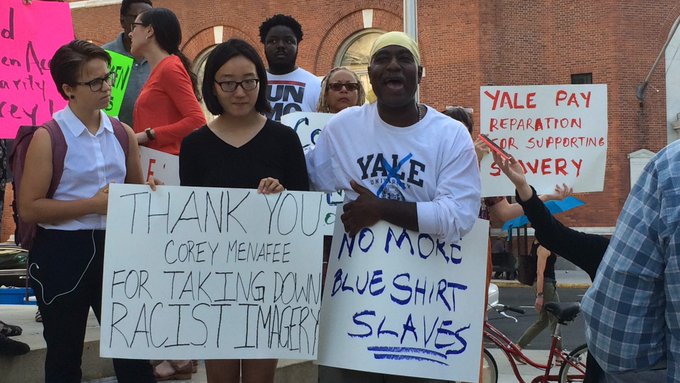
Corey Menafee. (Facebook)
A black dishwasher lost his job at Yale University and arrested after he smashed a stained glass window in the school’s Calhoun College that depicted slaves carrying bales of cotton.
Corey Menafee, 38, told the New Haven Independent he was tired of looking at the “racist, very degrading” image, so he climbed up and used a broomstick to break it. The pane was replaced with clear glass.
Calhoun College is named for John C. Calhoun, a South Carolina politician and 1804 graduate of Yale University whose pro-slavery and white supremacist beliefs have led to several decades of calls for the residential college’s name to be changed.
After students, alumni and members of the New Haven community rallied around Menafee, Yale announced it would be offering him a “second chance.”
“Mr. Menafee, who resigned in June after he admitted intentionally breaking a stained glass window, has expressed deep remorse about his actions and informed us that he would like to rescind his resignation. He will be allowed to return to a position in a different setting, starting on Monday, after serving a five-week unpaid suspension,” Yale deputy press secretary Karen Peart said in an email on July 19. She said the suspension includes the time since Menafee’s resignation on June 21.
Menafee has not yet said if he will accept Yale’s offer.
“Yale has already asked the State’s Attorney to drop all charges. We are willing to take these unusual steps given the unique circumstances of this matter, and it is now up to Mr. Menafee whether he wishes to return to Yale,” Peart said.
Here’s what you need to know:
1. He Says He Climbed Up & Knocked the Panel Out Because He ‘Shouldn’t Have to Come to Work & See Things Like That’ in 2016
Corey Menafee told the New Haven Independent that in 2016 he “shouldn’t have to come to work and see things like that.”
So, on June 13, he decided to knock out the panel of the stained glass window.
“I just said, ‘That thing’s coming down today. I’m tired of it,’” he told the New Haven Independent. “I put myself in a position to do it, and did it.”
Menafee said he banged the window twice and it fell to the ground in pieces. The police were called.
“I just went to the bathroom and shaved, to make sure I was clean-shaven for the authorities,” Menafee said.
Menafee was then led out of the building in handcuffs, the Independent reports.
A Yale University spokesman told the Yale Daily News the shattered glass fell into the street, near a passerby, endangering a passerby. She was not injured.
The university said Menafee apologized and resigned.
He told the Independent he regrets what he did and is saddened he lost a job he loved.
“It could be termed as civil disobedience,” Menafee said. “But there’s always better ways of doing things like that than just destroying things. It wasn’t my property, and I had no right to do it.”
2. A Petition Has Been Started to Call for Charges, Including a Felony, To Be Dropped

(Connecticut Judicial Branch)
Menafee was arrested by New Haven Police on June 13 at the college. He was charged with first-degree criminal mischief, a felony, and second-degree reckless endangerment, a misdemeanor, according to online court records.
He faces up to five years in prison on the felony charge and up to two years in prison on the misdemeanor.
Yale University said in a statement to Gawker that it will not advocate for Menafee to be prosecuted and will not seek restitution.
Menafee told the New Haven Independent the university said they deemed him to be a potential threat to students. He disagrees.
“I didn’t commit any acts of violence against anyone or any living thing,” Menafee said. “I didn’t be belligerent, or yell. I just broke the windows.”
He was released on a promise to appear in court and has not yet entered a plea.
Dozens of supporters showed up at his court appearance on July 12 to call for the charges to be dropped, packing the court room, according to the Independent. The case was continued until July 26.
Menafee said he doesn’t own a phone or computer and was unaware of the reaction to his story.
A petition has been started to ask the New Haven Police Department and prosecutors to drop the charges against Menafee.
“Yale ought to thank Mr. Menafee for doing what it failed to do. As students have explained repeatedly, the name and imagery of Calhoun College take a heavy toll on all people of color who live and work in that building,” Sonja Anderson wrote.
“A black man shouldn’t have to look at images of slavery as he works a service job for Yale elite. It’s an insult and his anger and actions are more than understandable,” wrote Meredith Odinak. “To be charged with a felony for this is another example of disregard for and control of black America.”
A GoFundMe account set up to help him has raised more than $2,000.
“Corey Menafee is a former employee of Yale University who was fired after breaking a dining hall window featuring a racist depiction of slaves picking cotton. All proceeds from this fund will go directly to Mr. Menafee, to assist him in an interim of unemployment,” Bianca Brooks, who created the fund, said.
3. He Graduated From Virginia Union University & Has Worked as a Substitute Teacher
Menafee, a New Haven native, graduated from Virginia University in 2001 with a degree in mass communication, according to his Facebook page.
He previously worked for a management services firm and as a substitute teacher, according to the New Haven Independent.
Menafee, who is a writer, but has been unable to find work in his field, began working at Yale University in the dining hall in 2007, the Independent reports.
He is the father of two children.
4. Students Rallied Earlier This Year to Call for the Renaming of Calhoun College
The movement to take John C. Calhoun’s name away from the residential college picked up steam over the past year.
A petition calling for Calhoun College to be renamed amassed more than 15,000 signatures. Students led protests on the campus saying that symbols of white supremacy should be removed from public spaces.
One of those protesters told the Yale Daily News on Monday that he supported Menafee’s decision to smash the window and would have done the same thing.
“When you see something so public and so in front of your face, and the University doesn’t want to change the name of the college, people do things,” John Lugo, the leader of the New Haven social justice group Unidad Latina en Accion, said.
5. The University Decided Not to Change the Name Despite the Protests

Calhoun College. (GK tramrunner229/Wikipedia Commons)
Yale University President Peter Salovey announced in April that Calhoun College’s name would not be changed, despite the pleas from students. The university did change the name of the person in charge of residential colleges from master to head of college.
“Ours is a nation that often refuses to face its own history of slavery and racism. Yale is part of that history,” Salovey said in a statement. “We cannot erase American history but we can confront it, teach it, and learn from it. The decision to retain Calhoun College’s name reflects the importance of this vital educational imperative.”
Salovey said the university also planned a historical study of the legacy of John C. Calhoun and other parts of the institution’s past.
“The project will draw on the talents of Yale’s scholars, students, and staff, and will be designed to illuminate the lesser-known people, events, and narratives behind the familiar facades seen on campus,” the university said. “The study will enable students and scholars to understand not only those aspects of the university’s — and our nation’s — history that are a source of pride, but also those that are shameful and, therefore, essential to know and confront.”
Some students held a ceremonial renaming of Calhoun College after the decision was made:
Salovey also announced a competition opened to the university community to select a new work of public art to be displayed on Calhoun College’s grounds.
“Entrants will be asked to propose works that respond to the realities and consequences of Calhoun’s life and time, and will be encouraged to give the widest possible consideration to different creative approaches,” the university said. “This effort will supplement the ongoing work of the university’s Committee on Art in Public Places, which is charged with assessing artistic representations across the campus and making recommendations for ways that art can engage and illuminate the past in the context of present-day issues.”
Calhoun Head of College Julie Adams told students last week that damage to one of the windows led in the College’s dining hall led to a new review by Yale’s Committee on Art in Public Places, the Yale Daily News reports.








